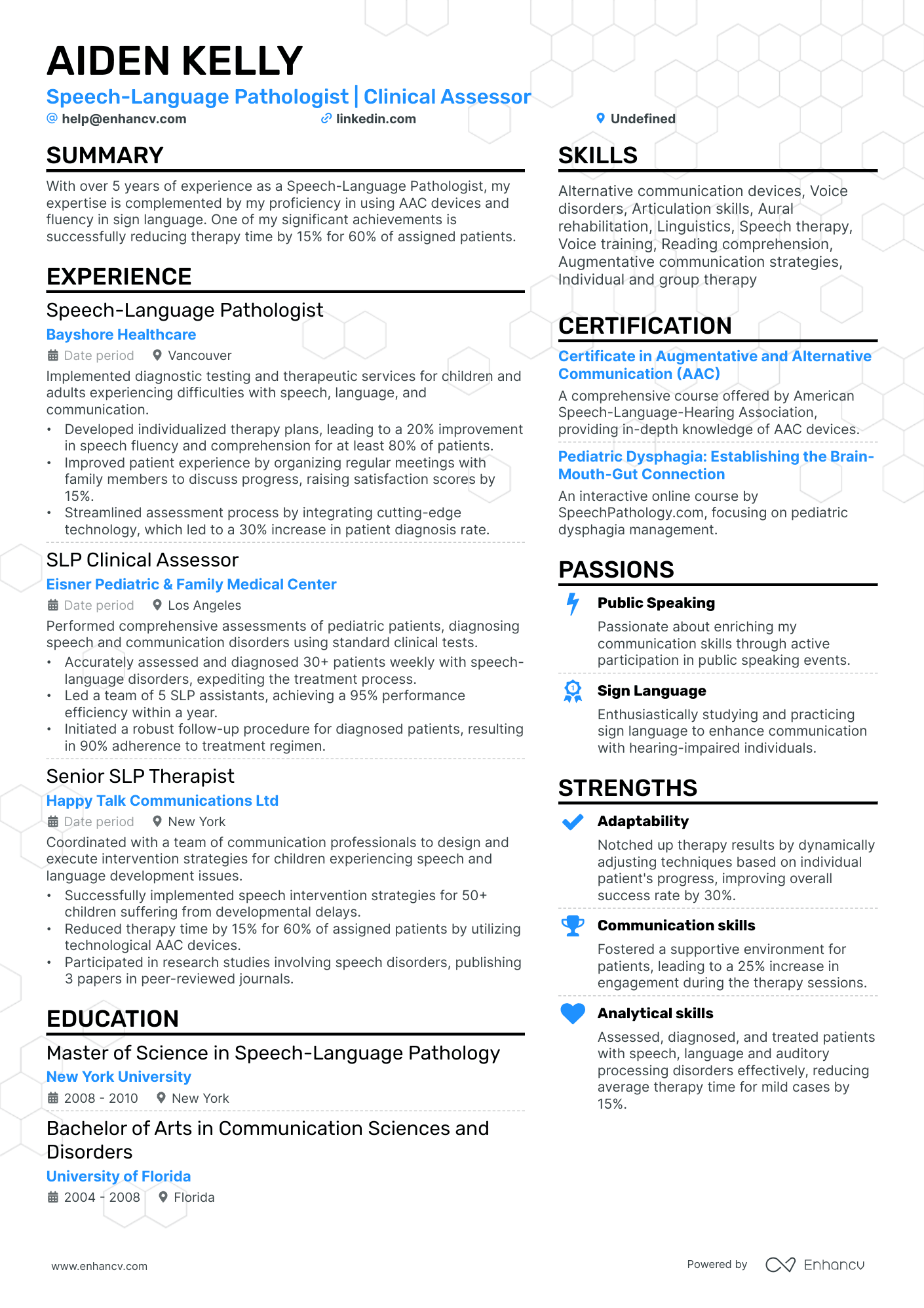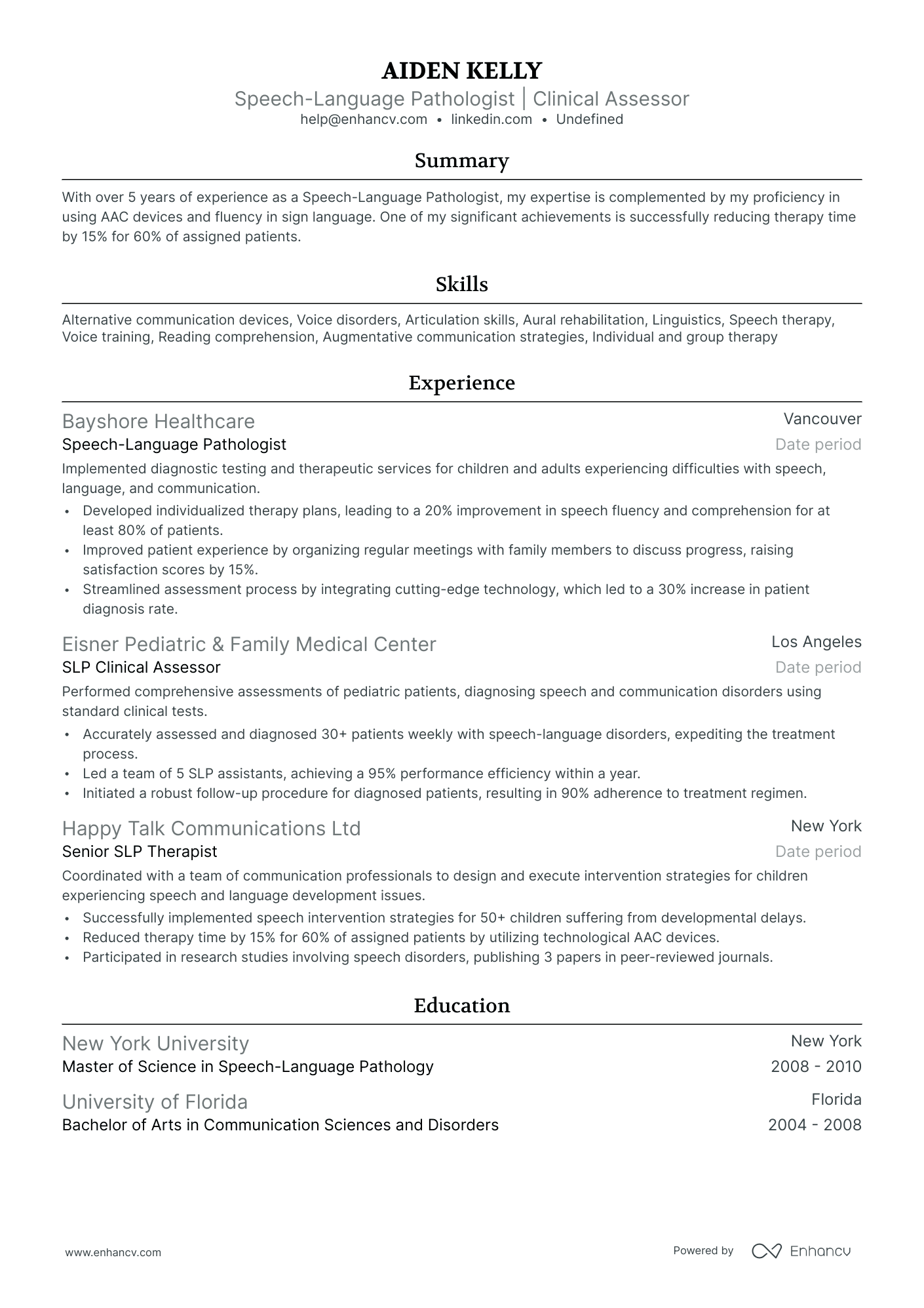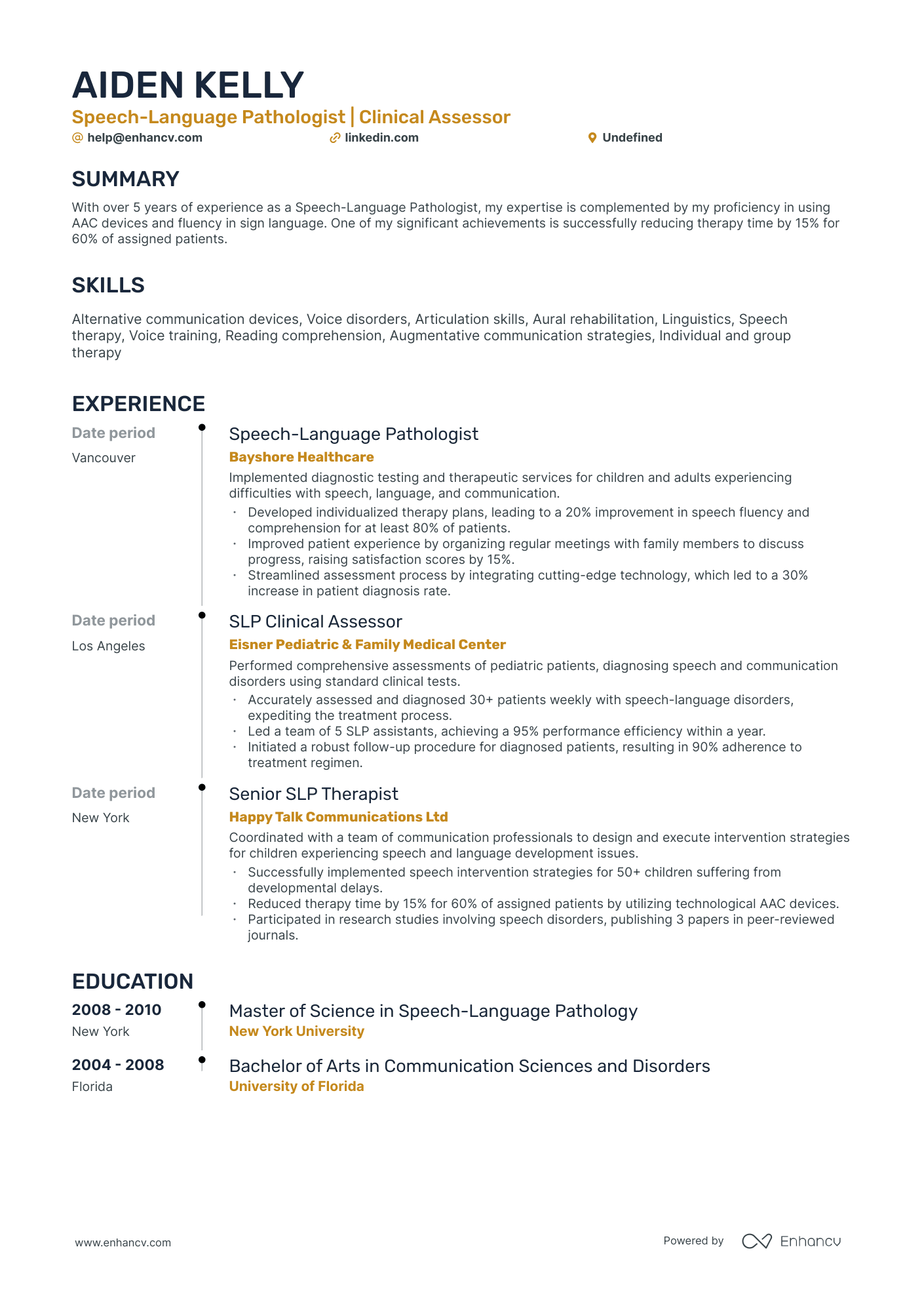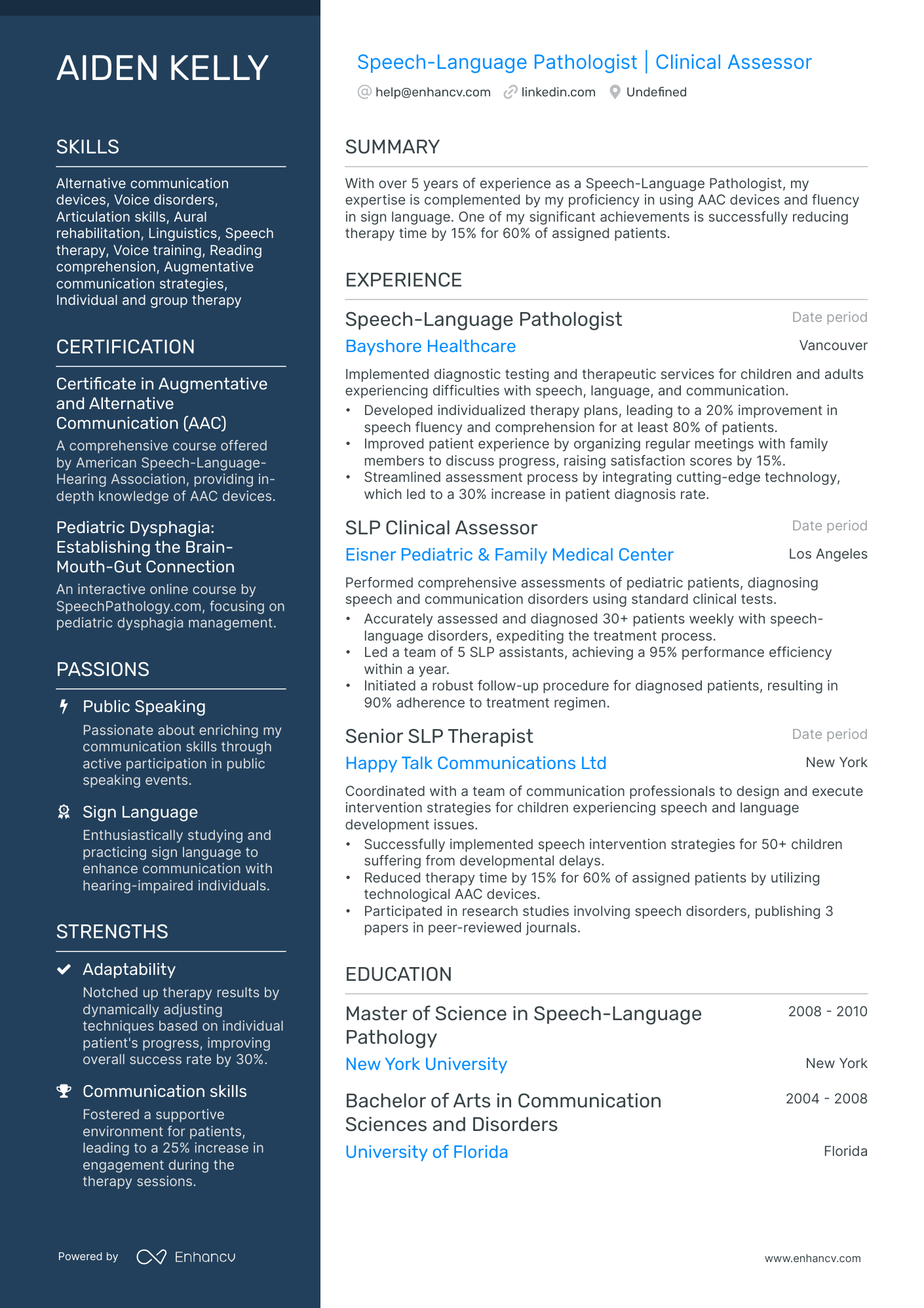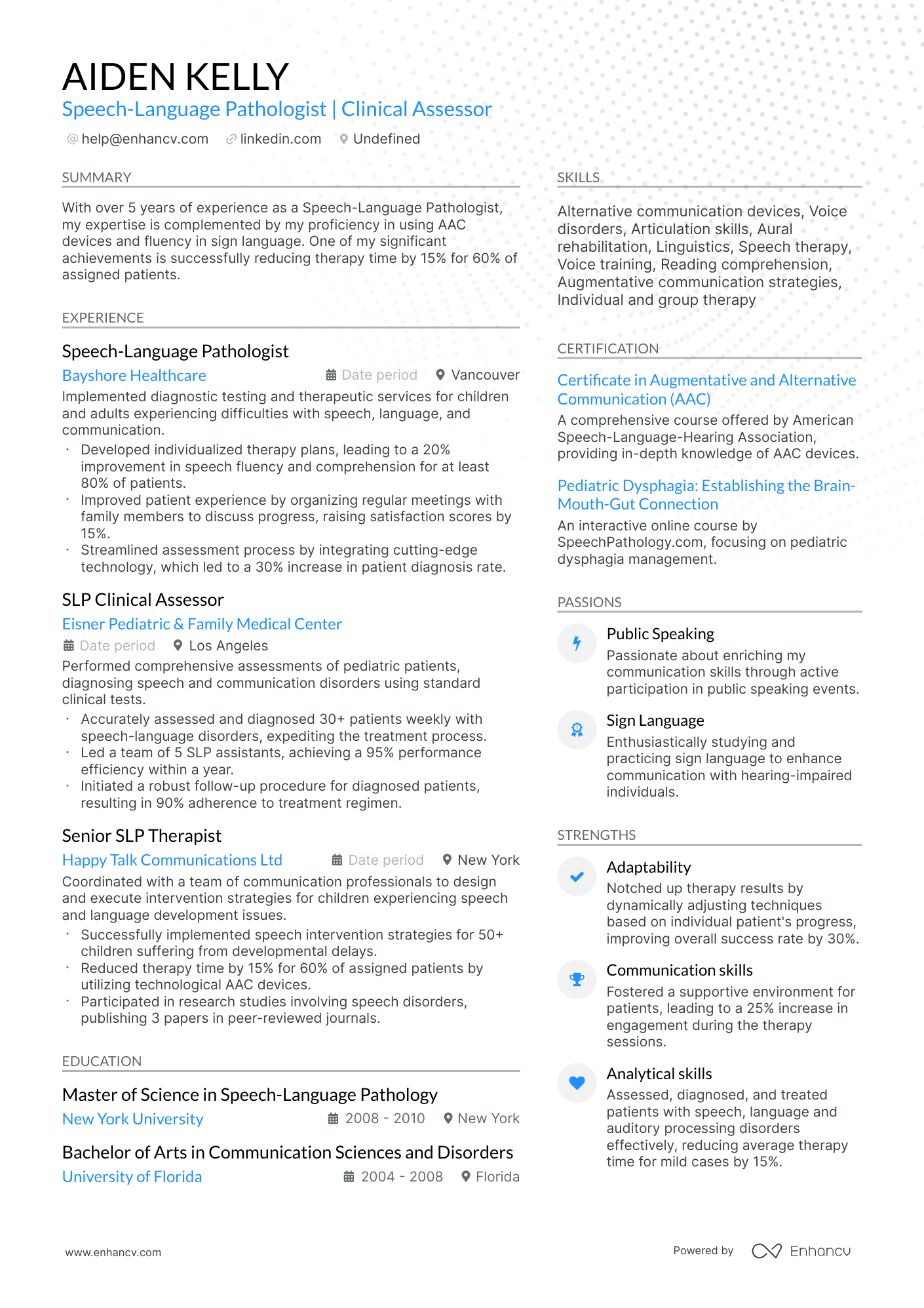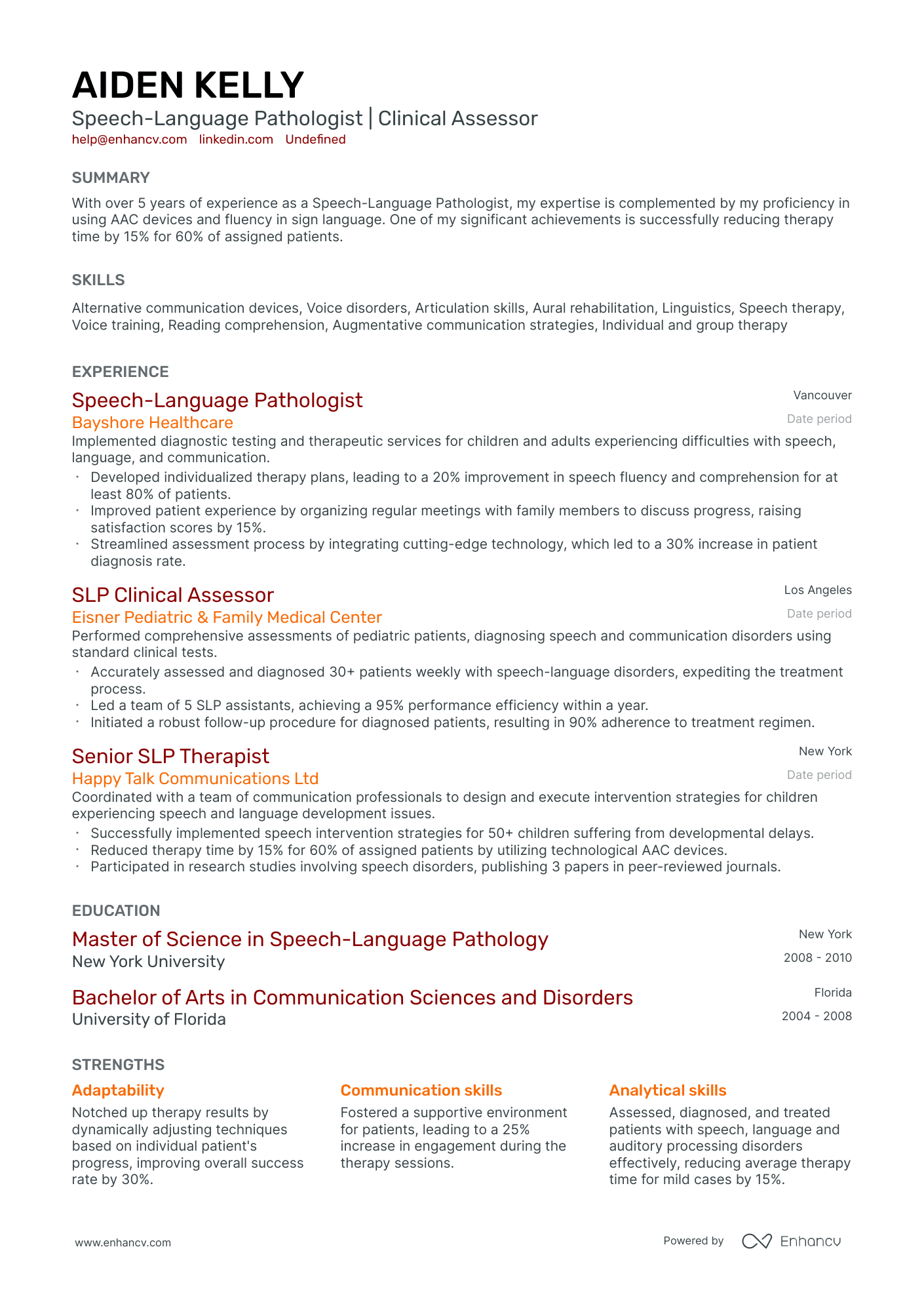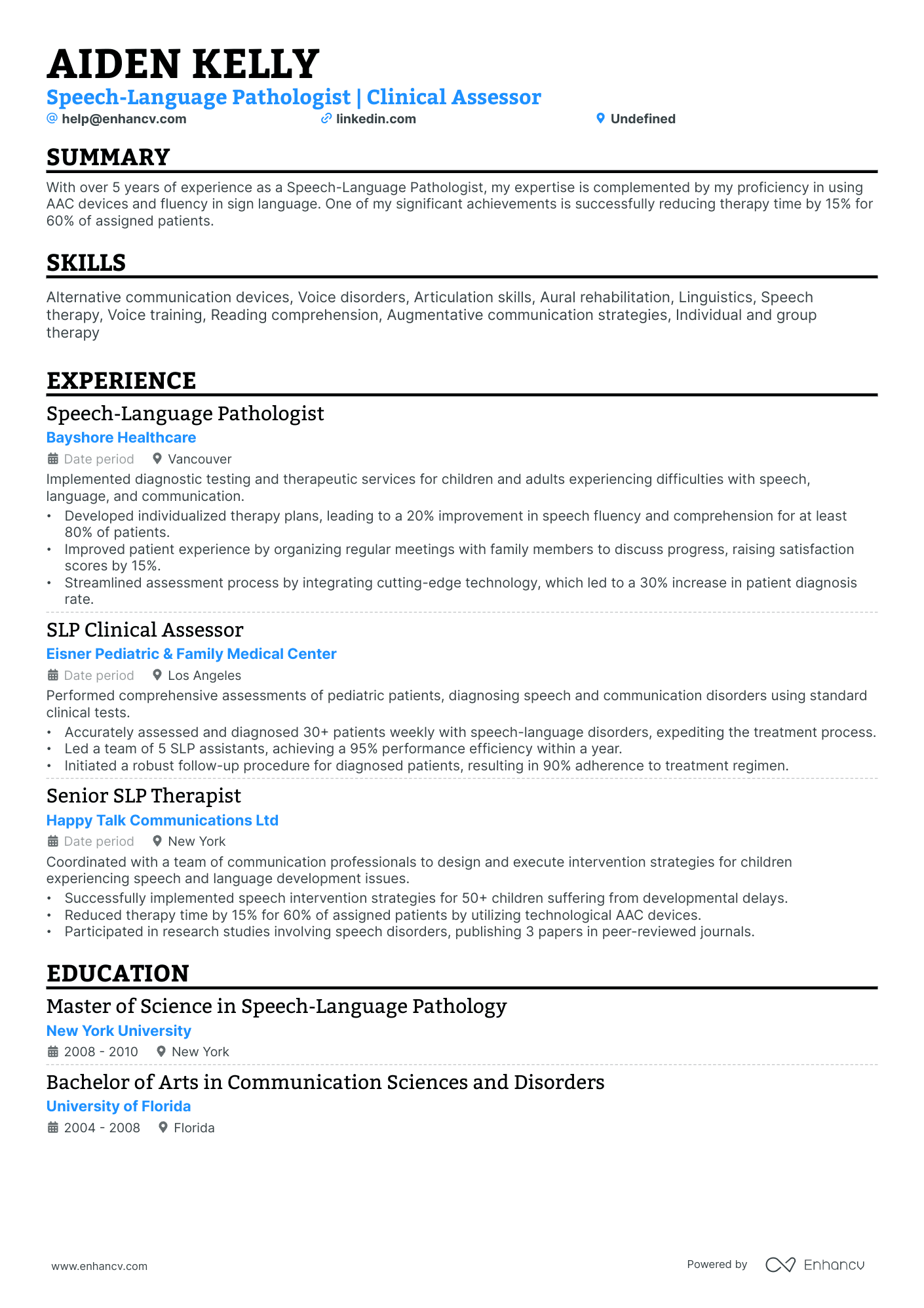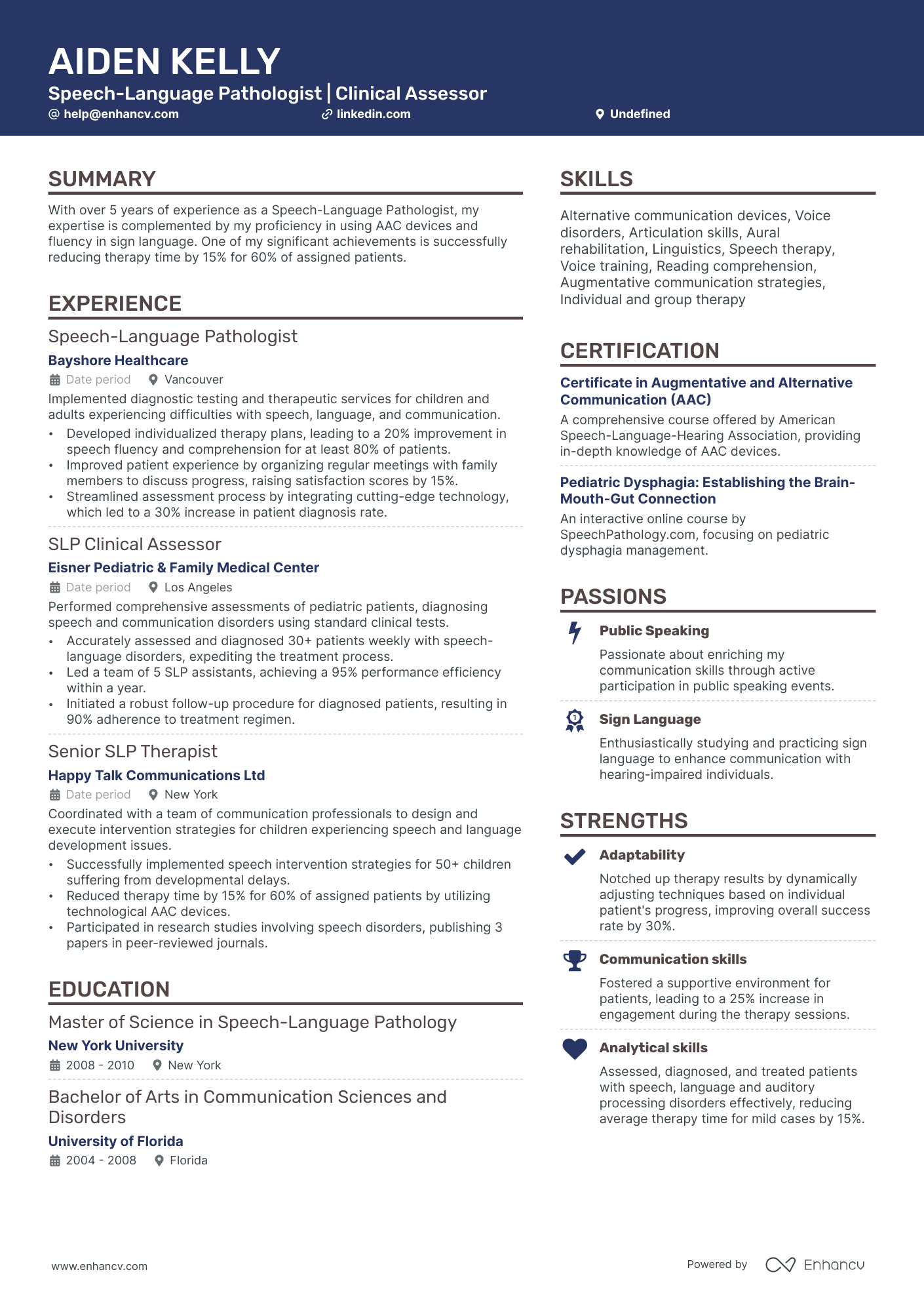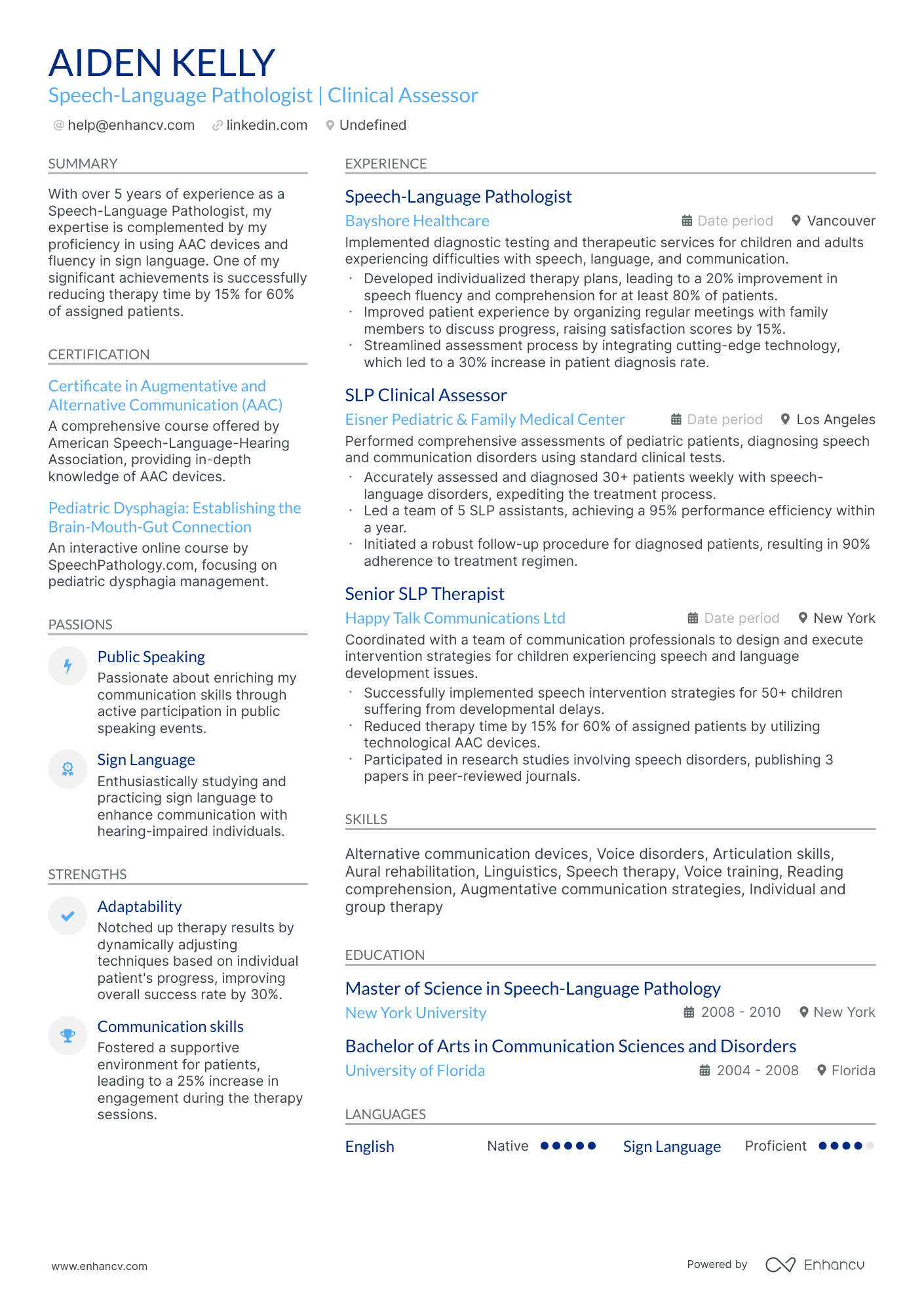SLP grad school applicants often struggle with effectively communicating their unique blend of academic knowledge and hands-on experience in Speech-Language Pathology on their resumes. Our guide provides step-by-step instructions and specific examples on how to clearly articulate these experiences, thus helping applicants stand out in the competitive pool of candidates.
Dive into our concise guide to learn how to:
- Show your SLP grad school career's brightest moments through your resume's summary, objective, and experience sections.
- Explore top-notch SLP grad school resume examples to understand how to distinguish yourself from other candidates.
- Identify the most sought-after SLP grad school skills and certifications in the industry.
- Design a structured yet unique resume layout.
Recommended reads:
Demystifying the SLP grad school resume format
While a touch of creativity can be appealing, it's the clarity and relevance of your SLP grad school resume format that truly resonates with recruiters.
To ensure your resume not only captures attention but also maintains it, consider these four streamlined steps:
- If your career boasts a wealth of pertinent and recent accomplishments, the reverse-chronological resume format is your ally. It naturally emphasizes your experience, placing your most recent roles at the forefront.
- Design a straightforward header: incorporate your contact information, a headline reflecting the position you're vying for or your current designation, and a link to your professional portfolio.
- While brevity is key, if you're targeting a senior position or have accumulated over ten years of industry-relevant experience, extending your resume to two pages is permissible.
- To ensure consistent formatting across various platforms, always save and submit your SLP grad school resume as a PDF.
Upload your resume
Drop your resume here or choose a file. PDF & DOCX only. Max 2MB file size.
Pro tip
Your resume will likely be processed by an Applicant Tracking System (ATS). Ensure your header, summary, or objective incorporates essential skills required for the role.
Essential components for your SLP grad school resume:
- Header: Feature your name prominently. If you have a notable degree or certification, append it next to your name. Include contact details, a link to your portfolio, and a concise headline.
- Summary or Objective: Align your professional trajectory and standout achievements with the desired role.
- Experience: Craft concise bullet points, highlighting tangible successes and contributions.
- Skills: Showcase them throughout your resume and consider a dedicated sidebar for emphasis.
- Education & Certifications: Reinforce your credibility and demonstrate your commitment to the industry.
What recruiters want to see on your resume:
- Clinical Experience: Recruiters value hands-on experience working with diverse populations in a variety of settings. This can be from internships, volunteering, or work experiences.
- Educational Background: A strong foundation in communication sciences and disorders is critical. This includes coursework, research projects, and academic performance (GPA).
- Communication Skills: As the role revolves around speech and language therapy, excellent verbal and written communication skills are vital, which can be demonstrated through presentations, publications, etc.
- Interpersonal Skills: Aspects such as empathy, patient management skills and ability to work with a team are important in an SLP role.
- Certifications and Training: Additional relevant certifications like CPR/First Aid training, ASHA certification, or specialized trainings (e.g., autism, dyslexia) are a plus.
Recommended reads:
How to create the cornerstone experience section of your SLP grad school resume
A meticulously crafted SLP grad school resume experience section is a recruiter's delight. This segment not only responds to job criteria but also throws light on your technical expertise and character.
To craft an impactful experience section:
- Highlight roles directly related to the position in question.
- Pair each role or task with a metric that quantifies your achievements.
- Chronicle your SLP grad school career progression, illustrating your dedication and growth in the domain.
- For each role, elucidate challenges faced, strategies employed, and the broader organizational impact.
Examine the following SLP grad school samples to discern how seasoned professionals have articulated their experiences:
- Conducted comprehensive speech and language evaluations for children aged 3-10 to assess communication disorders.
- Developed and implemented individualized treatment plans using evidence-based techniques to address articulation and language delays.
- Collaborated with parents and teachers to provide strategies and support for enhancing communication skills at home and in the classroom.
- Administered therapy sessions for children with autism spectrum disorder, resulting in improved social communication and pragmatic skills.
- Led a group intervention program targeting phonological awareness, resulting in increased reading readiness among preschoolers.
- Provided ongoing training and supervision to speech-language pathology assistants to ensure the consistent delivery of high-quality services.
- Managed a caseload of over 50 clients, providing assessment and intervention services for individuals with aphasia and other acquired communication disorders.
- Implemented augmentative and alternative communication strategies, including AAC devices and visual supports, to facilitate functional communication.
- Collaborated with a multidisciplinary team to develop and implement a language enrichment program for children from low-income families, resulting in improved language skills and school readiness.
- Provided training workshops to parents and caregivers on strategies for promoting speech and language development in young children.
- Conducted swallowing assessments and implemented dysphagia management plans for patients with various medical conditions, ensuring safe oral intake and minimizing aspiration risk.
- Developed and facilitated group therapy sessions for individuals with traumatic brain injury, focusing on cognitive-communication skills and social integration.
- Collaborated with a team of healthcare professionals to provide comprehensive care in a hospital setting, participating in interdisciplinary rounds and treatment planning.
- Assisted in the development and implementation of an early intervention program for infants and toddlers with developmental delays, resulting in improved communication and overall development.
- Conducted parent education sessions on language stimulation techniques and facilitated playgroups to promote social interaction among young children.
- Coordinated and supervised speech-language pathology interns, providing guidance and feedback on clinical skills.
- Managed a pediatric caseload, providing diagnostic and therapeutic services for children with speech sound disorders and phonological processing difficulties.
- Collaborated with schools to create and implement individualized education plans (IEPs) for students, ensuring appropriate accommodations and support services.
- Conducted workshops for teachers and parents on strategies to enhance speech and language development in the classroom and home environment.
- Provided telepractice services to clients across different states, delivering assessment, treatment, and progress monitoring remotely.
- Developed and implemented a social communication program for adolescents with autism spectrum disorder, addressing pragmatic language skills and peer interactions.
- Collaborated with school-based teams to support students with communication impairments, participating in Individualized Education Program (IEP) meetings and providing consultative services.
- Managed a caseload of adult clients in a skilled nursing facility, providing assessment and therapy for individuals with aphasia, dysarthria, and cognitive-communication deficits.
- Implemented evidence-based treatment techniques, such as constraint-induced aphasia therapy, resulting in improved functional communication and quality of life.
- Collaborated with occupational and physical therapists to develop comprehensive rehabilitation plans for patients with complex medical conditions.
- Conducted research on the efficacy of telepractice in delivering speech and language services to children with developmental disabilities, resulting in published articles in peer-reviewed journals.
- Developed and implemented augmentative and alternative communication (AAC) systems for nonverbal individuals, enabling functional communication and reducing frustration.
- Provided supervision and mentoring to graduate students in the speech-language pathology program, supporting their clinical skill development.
Quantifying impact on your resume
<ul>
No experience, no problem: writing your SLP grad school resume
You're set on the SLP grad school role of your dreams. Yet, you have little to no work experience . Here's how you can curate your resume to substitute your lack of experience:
- Don't list every single role you've had so far, but focus on the ones that align with the job you're applying for
- Include any valid experience in the field - whether it's a university research project, or a summer internship
- Highlight the soft skills you're bringing along - those that will have an added value to your application.
- Focus on your education and certifications, especially if they make sense for the role.
Recommended reads:
Pro tip
When detailing your career journey, there's no need to delve deep into early roles. Prioritize what resonates with recruiters. For senior positions, a decade-long retrospective can effectively illustrate your evolution.
Creating your SLP grad school resume skills section: balancing hard skills and soft skills
Recruiters hiring for SLP grad school roles are always keen on hiring candidates with relevant technical and people talents.
Hard skills or technical ones are quite beneficial for the industry - as they refer to your competency with particular software and technologies.
Meanwhile, your soft (or people) skills are quite crucial to yours and the company's professional growth as they detail how you'd cooperate and interact in your potential environment.
Here's how to describe your hard and soft skill set in your SLP grad school resume:
- Consider what the key job requirements are and list those towards the top of your skills section.
- Think of individual, specific skills that help you stand out amongst competitors, and detail how they've helped you succeed in the past.
- Look to the future of the industry and list all software/ technologies which are forward-facing.
- Create a separate, technical skills section to supplement your experience and further align with the SLP grad school job advert.
Find the perfect balance between your resume hard and soft skills with our two lists.
Top skills for your SLP grad school resume:
Speech Assessment Tools
Augmentative and Alternative Communication (AAC) Devices
Speech Therapy Software
Clinical Documentation Software
Telepractice Platforms
Phonetic Analysis Software
Data Analysis Tools
Anatomy and Physiology Knowledge
Language Development Theories
Cognitive-Communication Assessment Tools
Empathy
Communication Skills
Critical Thinking
Patience
Adaptability
Collaboration
Problem-Solving
Time Management
Active Listening
Cultural Competence
Pro tip
Don't go all over the place with your skills section by listing all keywords/ buzzwords you see within the ad. Curate both hard and soft skills that are specific to your professional experience and help you stand out.
Optimizing the education and certification sections of your SLP grad school resume
Your education and certification sections can be game-changers on your SLP grad school resume, showcasing your commitment to professional growth.
For the education section:
- Highlight advanced education, noting the institution and duration.
- If you're currently studying, mention your expected graduation date.
- Exclude degrees that don't align with the job's requirements.
- If relevant, delve into your academic journey, spotlighting significant achievements.
When listing degrees and certifications:
- Feature those directly relevant to the role.
- Highlight recent and significant knowledge or certifications at the top of your resume.
- Provide essential details like the issuing institution and dates for credibility.
- Avoid listing irrelevant degrees or certifications, such as your high school diploma or unrelated specializations.
Remember, even if you're tempted to omit your education or certifications, they can offer a competitive edge, signaling a long-term commitment to the industry.
Best certifications to list on your resume
Pro tip
List your degrees in reverse order, starting with the newest. A recent PhD or unique field could set you apart.
Recommended reads:
Best practices for your SLP grad school resume summary or objective
How do you know if you should include a resume summary or a resume objective?
- Resume summaries are ideal for SLP grad school professionals with more experience, who'd like to give a quick glimpse of their biggest career achievements in the top one-third of their resumes.
- On the other hand, resume objectives serve as a road map to the applicant's aspirations. Candidates use the objective as the North Star of their career (or, how they see themselves in the role in the next few years).
Both could be the perfect fit for your SLP grad school resume, depending on your experience.
Here's how candidates for the SLP grad school job structure their summaries and objectives.
Resume summary and objective examples for a SLP grad school resume
Extra sections to boost your SLP grad school resume
Add more sections to show off your unique skills and personality.
- Projects - Include any impressive ones you've done outside of work.
- Awards - Show off any industry recognition.
- Volunteering - Share causes you care about and skills you've gained.
- Personality - Hobbies or favorite books can give a glimpse into who you are.
Key takeaways
- Your resume should be a curated narrative, highlighting your alignment with the role's requirements.
- Strategically position your skills, balancing both technical and interpersonal strengths.
- Be selective in detailing experiences, focusing on relevance and impact.
- Utilize the summary or objective to offer a snapshot of your professional essence.
- Across all sections, prioritize authenticity and clarity, ensuring your resume resonates with the SLP grad school role you're eyeing.
